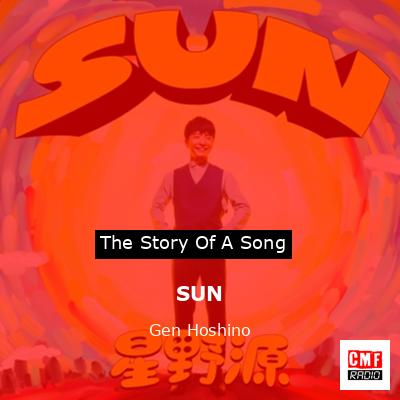The discography of Japanese singer-songwriter, musician, and actor Gen Hoshino consists of five original studio albums, two extended plays (EPs), eight live albums, seventeen compilations, twenty-three singles, nine promotional singles, and thirty-five music videos (including works as featured artist). After only releasing music physically, his full discography was released for digital download on June 23, 2015, and for streaming on August 30, 2019.
Hoshino debuted as the frontman of the instrumental band Sakerock (2000–2015), where he played guitar and marimba. He self-released a CD-R entitled Baka no Uta in 2005, and in 2007 released a CD entitled Barabara as a bundle to a booklet by photographer Taro Hirano. After he was approached by former Yellow Magic Orchestra member Haruomi Hosono and his label Daisyworld, Hoshino re-used the title of the 2005 CD-R for his debut studio album Baka no Uta in June 2010. A joint issue by Daisyworld's Labels United, Victor Entertainment's Speedstar Records, and the Sakerock-signed Kakubarhythm, the album charted at number 36 on the Oricon's Albums Chart. Hoshino debuted on the Billboard Japan Hot 100 with the single "Kudaranai no Naka ni" (2011) at number 12, and released his second album Episode solely through Speedstar on September 28, 2011, to a peak at number five on Oricon.
Three singles were released by Hoshino throughout 2012—"Film", "Yume no Soto e", and "Shiranai"—which charted on the Hot 100 at fifth, fourth, and third, respectively. They supported his third studio album Stranger (released on May 1, 2013), which had been delayed by Hoshino falling ill to a subarachnoid hemorrhage in December 2012. The 76th best-selling Japanese album of the year, it peaked at number two on the album charts, and was certified gold by the Recording Industry Association of Japan (RIAJ) in 2017. Hoshino went into a second hiatus in June 2013 after a reinspection revealed a relapse in the hemorrhage. The single "Why Don't You Play in Hell?" (2013; for the film of the same name) was released during his hiatus, and the double A-sided "Crazy Crazy" / "Sakura no Mori" (2014) marked his first release after a return to activities. In 2015, Hoshino received his first song certification with "Sun", the theme to the television drama series Kokoro ga Pokitto ne (2015), which attained a triple-platinum certification for digital sales, and also received two gold awards within the RIAJ's physical and streaming categories. It was followed by Hoshino's fourth album Yellow Dancer on December 2, 2015, which was his first number one on the Billboard Japan Hot Albums chart and also the East Asian music chart in Taiwan. The album received platinum and gold certifications from the RIAJ in the physical sales and download categories, respectively, and placed sixth on Billboard Japan's year-end ranking for 2016.
In 2017, Hoshino topped the year-end Hot 100 with his 2016 single "Koi", the ending theme to the popular television drama The Full-Time Wife Escapist (2016), which also stars Hoshino in a lead role. "Koi" spent seven consecutive weeks atop the Japan Hot 100 and 11 weeks at number one in total; one of the most successful songs on the Hot 100, it achieved number five on the March 2023 all-time chart. The RIAJ has certified "Koi" two-times million in digital sales and also gave it two different platinum awards for physical sales and streaming. Following "Koi", Hoshino achieved four consecutive number ones with "Family Song" (2017), "Doraemon" (2018), and "Idea" (2018), which were all certified platinum. "Idea"—a digital-exclusive—became the first song on the Japan Hot 100 to hold first place for consecutive weeks without physical sale points. "Koi", "Family Song", and "Idea" were featured on Hoshino's fifth studio album, Pop Virus, on December 19, 2018. With four weeks atop the Japan Hot Albums chart, it was certified double-platinum and placed second on the 2019 year-end chart. Oricon ranks it as Hoshino's best-selling album.
Though the aftermath of Pop Virus left Hoshino burnt out, his befriending of the London-based indie band Superorganism, Japanese rapper Punpee, and English musician Tom Misch resulted in the production of the four-track EP Same Thing (2019), which peaked at number four on the Oricon Combined Albums Chart. In 2021, Hoshino released the singles "Create" and "Fushigi", which charted at numbers 94 and 71 on the Billboard Global Excl. US chart, his first international chart entries. "Comedy" (2022), the ending theme to the anime series Spy × Family (2022–), entered the Global 200 at 127 and also charted in Taiwan at 21. In 2023, Hoshino released his second EP, Lighthouse, comprised by theme music for the Netflix talk show of the same name that he co-hosted with comedian Masayasu Wakabayashi. It charted at number six on the Billboard Japan Hot Albums and at 18 on Oricon's Combined Albums. Hoshino's sixth studio album, eponymously titled Gen, is set for release on May 14, 2025. It will be his first album in over six years.
Indie releases
Studio albums
Extended plays
Live albums
Compilations
Videos
Box set
Streaming-exclusive playlists
Miscellaneous
Singles
As lead artist
As featured artist
Promotional singles
As lead artist
As featured artist
Other charted songs
Other appearances
Music videos
Footnotes
References
External links
- Official website of Hoshino
- Gen Hoshino discography at MusicBrainz
- Gen Hoshino discography at Discogs



